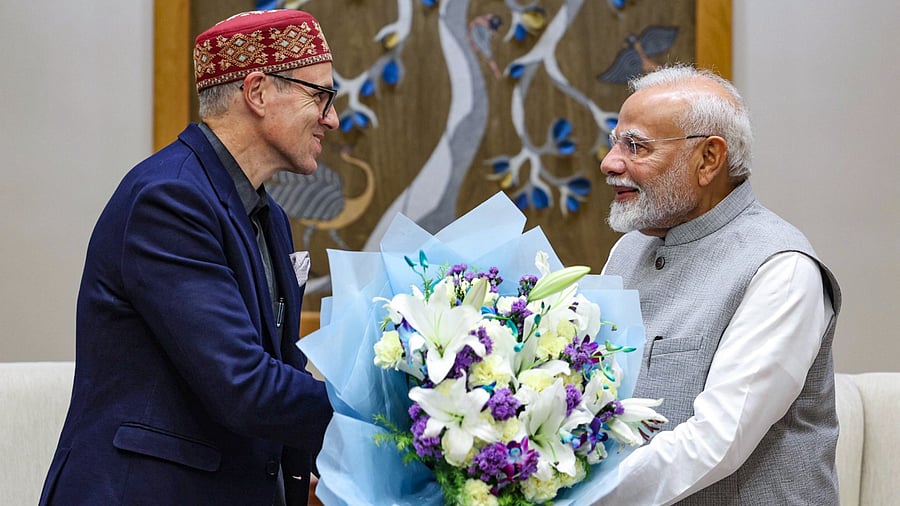
Prime Minister Narendra Modi with Jammu and Kashmir Chief Minister Omar Abdullah during a meeting, in New Delhi.
Credit: PTI Photo
Srinagar: Jammu and Kashmir Chief Minister Omar Abdullah seems to be moving closer to the BJP and Prime Minister Narendra Modi, a stark contrast to his earlier stance where he had often held the saffron party responsible for “destroying” the region.
After the abrogation of Article 370 in August 2019 and in the years leading up to his return to power, Omar was a vocal critic of the BJP, holding the, responsible for all the actions that “destroyed” Jammu and Kashmir.
He repeatedly blamed the BJP for exacerbating tensions in the Muslim majority region, accusing them of stoking divisiveness and ignoring the aspirations of the people of Jammu and Kashmir.
Prior to that while scoffing at the BJP’s ‘Sankalp Patra’, its manifesto for the Lok Sabha elections, he said it is aimed at the ‘destruction’ of the erstwhile state.
However, recent statements and actions by the chief minister suggest a noticeable shift in his political positioning.
Just three months after coming to power, Omar praised PM Modi for J&K's development and held a peaceful election when the prime minister inaugurated Rs 2700 crore Sonamarg tunnel on January 13, 2025.
In October 2024, just after winning election, he publicly stated that the government in Jammu and Kashmir “needs to have coordination with the Centre,” acknowledging that “many issues of J&K can’t be resolved by fighting with the Centre.”
This remark, while pragmatic, marks a departure from his earlier confrontational approach towards the BJP-led government at the Centre.
Omar’s move toward a more conciliatory tone was also evident in November 2024, when his party, the National Conference (NC), passed a resolution in the Jammu and Kashmir Assembly. The resolution, though reaffirming the importance of the region’s special status, was noticeably more cautious.
His dad and NC president, Farooq Abdullah, has also voiced support for a cooperative approach, stating, “The J&K government can’t fight with the Centre.”
The perception of growing closeness between the NC and the BJP has raised eyebrows among Omar’s rivals. In response he sought to clarify his position, saying, “There are no discussions, nor is there any scope or need for an alliance with the BJP.
“Our views on Jammu and Kashmir are completely different, and we will discuss all issues during the session,” he told reporters outside the Assembly House on Monday.
Despite Omar’s clarification, the shift in tone has not gone unnoticed. J&K People’s Conference leader and legislator Sajjad Lone questioned the chief minister’s new approach, saying, “During the election campaign it was all about Article 370 and how all others are with BJP. And now, the ideological overlap. What a comedown.”
People’s Democratic Party (PDP) legislator Waheed Parra also criticised Omar for changing the political discourse after coming to power, accusing him of downgrading it to statehood and failing to advocate for the restoration of Article 370, the release of political prisoners, and reconciliation as promised in the NC’s election manifesto.
Political analyst Javid Trali pointed out that Omar’s shift may reflect a recognition of the new political realities following the abrogation of Article 370. “Omar knows his limitations as CM of a Union Territory and seems to prefer a conciliatory path rather than confrontation with the Centre,” Trali said.
As the political landscape continues to evolve, it remains to be seen whether Omar will soften his stance further, or will he return to a more confrontational approach if the Center fails to return the favor?